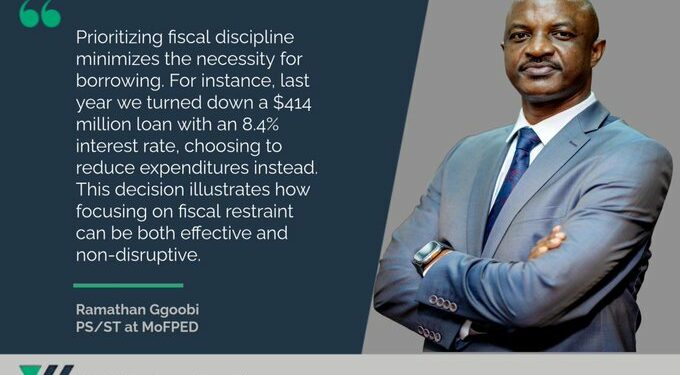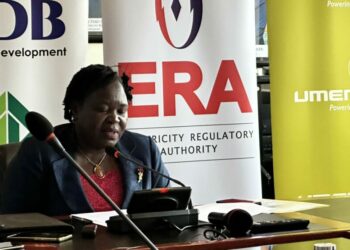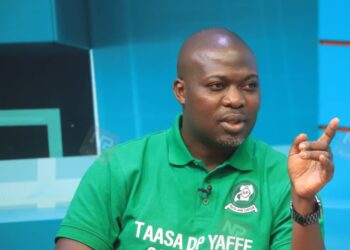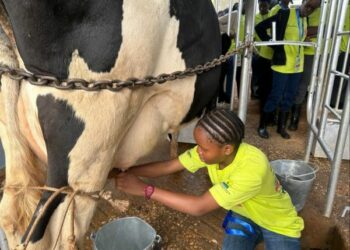In the heart of 2021, as the world grappled with the relentless grip of the COVID-19 pandemic, Uganda’s economy was on shaky ground. Businesses shuttered, jobs vanished, and livelihoods hung by a thread. It was a stormy season, and President Yoweri Kaguta Museveni, a leader known for bold moves, turned to a youthful, sharp-minded economist to steady the ship. Enter Ramathan Ggoobi, a lecturer from Makerere University Business School, appointed on July 15, 2021, as the Permanent Secretary and Secretary to the Treasury (PSST) in the Ministry of Finance, Planning and Economic Development. At a time when hope felt scarce, this unassuming man from Butambala stepped into a colossal role, ready to burn the midnight oil for Ugandans.
I’ve always believed one person can spark change, and Ggoobi’s story proves it. A disciple of “economics that works,” as he calls it, he wasn’t just another suit in a boardroom. Born in Ngando, Kitagobwa, to a family of teachers, he’d walked the halls of Kitagobwa UMEA for his early education before shining at Makerere University, earning a Bachelor’s in Economics in 2003 and a Master’s in Economic Policy and Planning in 2010. He’d taught, researched, and written—penning a bold column, “Are You Listening Mr. President,” for years—challenging the status quo. Now, Museveni handed him the wheel, tasking him to guide a battered economy back to life, with a vision to make it work for the common Ugandan.
The challenge was daunting. Lockdowns had slashed growth, with the Bank of Uganda later noting economic activity dropped by more than half at the pandemic’s peak. Inflation loomed, the shilling wobbled, and families struggled to put food on the table. But Ggoobi, a dynamic leader, didn’t flinch. Teaming up with the Ministry of Finance and the Bank of Uganda, he rolled up his sleeves. I picture him late at night, poring over budgets, crafting strategies—vaccination drives to reopen the economy, stimulus packages to lift businesses, and debt management to keep Uganda afloat. His mantra? Prioritize wealth creation, jobs, and incomes for the everyday person, just as Museveni had urged.
Fast forward to June 2025, and the fruits of that grit shone bright. In his State of the Nation Address this week, President Museveni painted a vivid picture of a country on the move. “Uganda is marching forward,” he declared, his voice brimming with pride. He spotlighted the economy’s rebound—Gross Domestic Product growth hitting 6% in 2023/24, outpacing Sub-Saharan Africa’s 3.8% average. The size of the economy, Ggoobi’s team reported, swelled to Shs202 trillion ($53.3 billion), up from Shs184.3 trillion. Inflation, once a lurking threat, was tamed, hovering at manageable levels. The Ugandan shilling, bolstered by export drives and prudent policies, found stability, giving traders and farmers a fighting chance. Museveni nodded to these fundamentals, crediting the technical team’s resolve to follow his guidance: make the economy serve the common man.
Ggoobi’s touch was clear. He’d realigned the budget to fuel agro-industrialization, tourism, and infrastructure—roads, energy, and rail—while pushing the Parish Development Model to lift rural households. Oil and gas projects, gearing up for first oil in 2025/26, got Shs920 billion, a bet on future growth. I see him as a quiet force, leading a “professionally apt, young, dynamic” team, as he called them, to turn Museveni’s vision into reality. Coffee exports jumped from $156 million to $212 million in a single quarter, proof the common Ugandan—farmers, traders, and workers—reaped the rewards.
Challenges linger—global price spikes, a slow tourism recovery—but Ggoobi’s not done. In 2021, he tweeted, “This simple boy from Butambala believes in economics that works and hates accountability without results.” True to his word, he’s delivered measurable progress, steering Uganda from pandemic chaos to a hopeful dawn. President Museveni’s trust in this youthful PSST paid off, and for folks like you and me, the economy’s pulse beats stronger, a testament to Ramathan Ggoobi’s midnight oil.
Do you have a story in your community or an opinion to share with us: Email us at editorial@watchdoguganda.com













